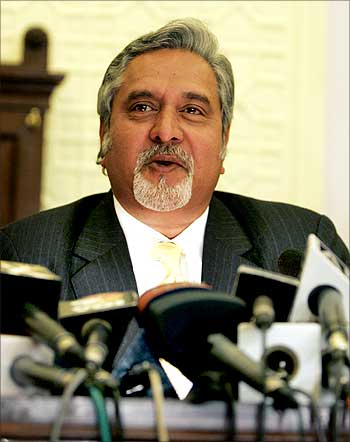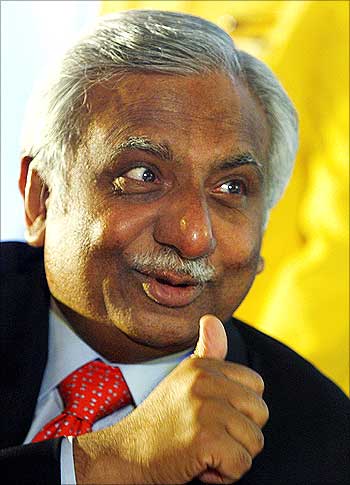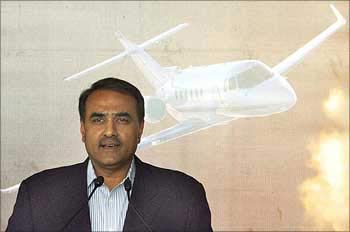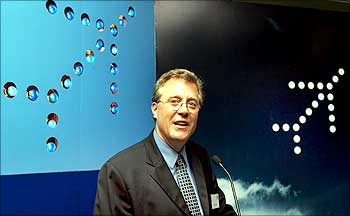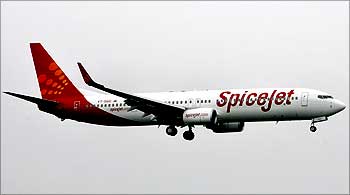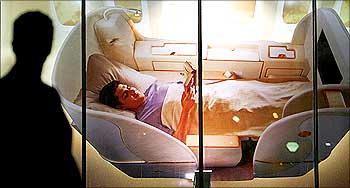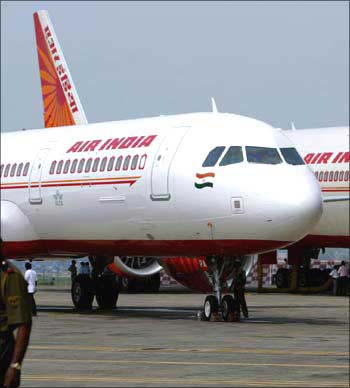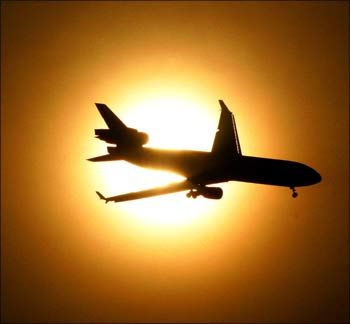 | « Back to article | Print this article |
5 reasons why airline strike went bust
It began with a bang and ended in a whimper.
On Friday, July 31 India's private airlines dropped a bombshell. They demanded a bailout package from the government, failing which they would suspending operations 'indefinitely'. But less than 48 hours after their militant call, the proposed August 18 strike fizzled out and turned into a public relations nightmare for the airline body.
All the bluster seemed to have vanished into thin air, even though some of the demands of the industry like excessively tax on aviation turbine fuel, high airport costs, etc -- are legitimate.
So why did the airline industry blink and decide to beat it? Well, quite a few reasons for it actually. Read on. . .
5 reasons why airline strike went bust
First, the government knew it was on firm ground given the fact that even the bailout package for a state-owned airline -- Air India -- was being met with extreme opposition by the public.
Civil Aviation Minister Praful Patel issued a stern warning to all the airlines saying suspension of operations would not be tolerated.
"The government cannot be expected to help private airlines financially. The tax on aviation turbine fuel has been an issue long before many of the present airlines came into existence, the minister said.
A day after private airlines called off their planned strike, the government on Monday ruled out any financial package for them but promised to do whatever possible to address the 'reasonable' grievances of the aviation industry.
"Their cannot be any financial bailout for any of the private airlines. Any issue, which is reasonable and fair, the government will try its best and to do whatever best is possible," Civil Aviation Minister Praful Patel said.
5 reasons why airline strike went bust
Patel, while responding to questions on private carriers calling off their Aug 18 strike, said the government understood the difficulties faced by the airline industry and would try to help the sector which was important for the economic development of the country.
Patel, however, disapproved of their earlier decision to suspend flight operations, saying causing inconvenience to passengers was 'not acceptable'.
Maintaining that Air India was also not getting a bailout package, Patel said, "The government is the owner and we have to do whatever is necessary. After all, it is our own airline. But to say that even Air India is getting money from the government exchequer, will not be correct."
The Federation of Indian Airlines, the umbrella body of the industry, had on Sunday evening called off its proposed action after facing threat of stern government action.
5 reasons why airline strike went bust
Second, the Federation of India Airlines did not handle the entire episode correctly. A, there was the unilateral decision to go on a one-day strike on August 18. B, there was the threat of suspending operation indefinitely. C, all this was done without really estimating if all members of the FIA were united in this cause or not. D, there was no back-up plan to counter what would the private airlines do if the government adopted a no-nonsense, uncompromising stance -- which it did.
Never before had a private industry body in India threatened the government with a nationwide strike if it was not bailed out of its financial problems. What should have come as a blow to the solar plexus of the government with the important airline sector being crippled because of the strike, in effect turned out to be a case of a self-goal.
With little public support to back them, the airlines had no option but to fall in line.
The airlines realised that their threat had backfired majorly. To salvage some pride after retreating in face the government hardline, they said they did not want to threaten or blackmail the government and the public, but just wanted to appraise the government of the debilitating problems they faced and wanted rationalisation of high ATF costs and airport charges.
'In view of the agitated public sentiment and potential inconvenience to thousands of passengers on one hand and government's willingness to enter into dialogue, the FIA has decided to put on hold its decision to suspend flights on August 18. The FIA hopes that constructive dialogue with the government will lead to redressal of the problems faced by the aviation industry,' the industry body said in an apparent move to save face.
5 reasons why airline strike went bust
And although the demands of the airline industry are not wholly unjustified the manner in which it handled the issue, botched up their chances of getting help.
The fact is that ATF prices are much higher in India than in other nations. The government also admitted in Parliament on Monday that central and state taxes made up for more than one-third of the jet fuel price, corroborating the statement of private airlines which had threatened to go on a 'strike' over their demand for a cut in the levies.
However, the government said, it did not control the price of ATF as it was a deregulated product.
The civil aviation ministry knows that the tax on ATF -- which is levied by the state governments -- is quite high and needs to be rationalised. However, neither the finance or petroleum ministries, nor the state governments pay heed to his call. Thus, while ATF tax is at 4% in Andhra Pradesh, it is at 28% in Karnataka.
The minister of state for petroleum and natural gas, Jitin Prasada, told Rajya Sabha in a written reply that the Rs 37.48 per litre retail selling price of aviation turbine fuel (ATF) in Mumbai comprised Rs 13.46 a litre in excise duty and sales tax.
The basic price of the jet fuel in Mumbai, the nation's busiest airport, was Rs 24.02 per litre. Freight and other cost add Rs 3.68 to the price while excise duty contributed Rs 2.28 a litre.
State sales tax is the biggest component, making up for one-fifth or Rs 7.50 per litre, of the retail ATF price, he said.
Sales tax was the highest in Chennai adding Rs 9.03 to the price and the lowest in Delhi where only Rs 6.05 a litre was added. In Kolkata, the state government earned Rs 8.88 per litre from jet fuel sales.
Prasada said sales tax on petrol made for more than one-fifth of the retail price of Rs 48.76 a litre on Mumbai. The Maharashtra government earns Rs 11.77 from petrol. The state government's sales tax added Rs 7.88 in the Rs 36.70 a litre sale price in Mumbai.
Delhi had relatively a lower sales tax, Rs 7.44 a litre on petrol and Rs 3.90 per litre on diesel, he said.
State-run fuel retailers revise price of the fuel that makes up for 40 per cent of the operating cost of airlines, every fortnight based on the average international rates.
5 reasons why airline strike went bust
Third, there is a distinct lack of unity in the airline federation. The smaller, leaner airlines seem to be doing a much better job at their business, than the bigger full-service airlines are managing to do. So, while Kingfisher and Jet Airways played the belligerent role and led the 'strike,' the low-cost airlines thought they were falling into a trap. As a result, first Indigo and then SpiceJet decided to drop out of the proposed August 18 strike.
This weakened the resolve of the other airlines when they realised that their own members were dropping the issue as if it were a hot potato. With their ranks fast depleting, the only option before the airline federation was to call off the strike.
5 reasons why airline strike went bust
Fourth, even as the airlines made a case for a bailout, arm-twisting the government for a bailout, many aviation experts, including Capt. G R Gopinath (father of the budget airline in India), said that there was no need for a bailout package, as the 'private airlines are themselves to blame for their losses.'
Gopinath, while speaking to a television channel, said that airlines 'did not follow a strategy that would lead to profits. India is a country where only 2 per cent of the population travels by air. The airline industry concentrated all its efforts on them. It did nothing to attract the 98 per cent population that uses road and rail travel. This was an unviable business strategy. But the industry followed it. That is the reason that led to the losses.'
He termed the private airlines' move a 'gimmick'. Big airlines like Jet and Kingfisher and Air India expanded to unjustifiable levels given the low passenger traffic in the country. Unless, these airlines cut costs, there was no way they could make profits, said other aviation experts.
5 reasons why airline strike went bust
Fifth, most experts feel that the strike threat was all a matter of timing and opportunism. With the government readying to bail Air India out, the private airlines thought that they too could wrangle a similar package for themselves. Or, they might manage to stop the bailout for Air India.
Gopinath also accused airlines of cartelisation. He said that 'airline operators got together as a cartel and fixed the price of airline tickets by blaming fuel surcharge. If this was done in any other country, it would be considered a crime. In fact, they would be jailed for the crime. But it was allowed in this country as we have no aviation policy. What India needs is an aviation policy and not a bailout package for the airline industry.'
However, none of the tactics seems to have worked. One other reason was also the cooked up issue of high airport charges. The airlines themselves hardly suffer on this count as they have been very quick to pass on the charge to the passengers.
